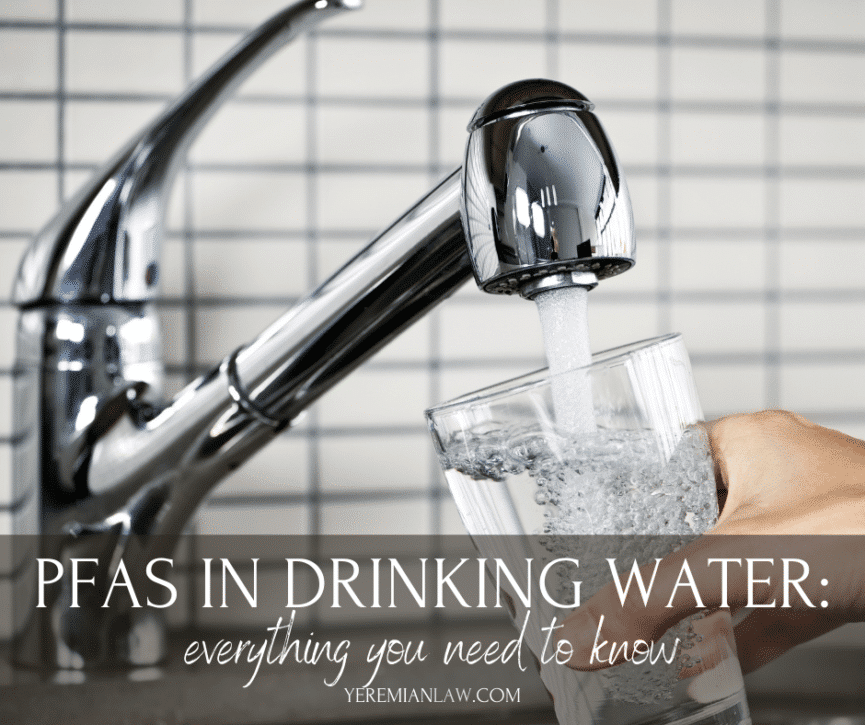PFAS in drinking water is a serious problem – so serious that many people have successfully sued over its harmful effects. Here’s what you need to know about PFAS in drinking water, what kinds of symptoms you might experience if you’ve been exposed, and when you can sue.
PFAS in Drinking Water: What You Need to Know
PFAS is short for perfluoroalkyl substances and polyfluoroalkyl substances, which are man-made chemicals that withstand high heat. The chemicals also repel water and oil, which makes them useful in a lot of everyday products – including carpets, non-stick pans, cleaning products and even food packaging. There are two specific types of these chemicals, both of which researchers have studied extensively, that can lead to health problems: PFOA and PFOS.
Related: What can I sue for?
What is PFOA?
PFOA is perfluorooctanoic acid, which has been used in making Teflon® and other chemicals. This chemical is often found in drinking water, but typically, only small amounts make it into the water. However, it sometimes shows up in higher concentrations in certain areas, like places near chemical plants that use it.
What is PFOS?
PFOS is perfluorooctanesulfonic acid, which is used in some film-forming foams that firefighters use to extinguish fires. It may have been released into the environment in the past (including by Teflon® manufacturers), as well as when the products it’s in degrade in landfills. PFOS can accumulate in your body, and it can damage internal organs.
Both of these chemicals are considered perfluoroalkyl substances, so they fall under the umbrella term PFAS.
Groundwater Contamination: How PFAS Gets Into Drinking Water
When PFAS contaminates the ground, it can seep into wells and other water sources. In fact, a major source of PFAS groundwater contamination is likely to be your local airport, military installation, oil refinery or firefighting training space – the foam used to extinguish fires often contains these types of chemicals.
Related: Product liability lawsuit FAQs
How PFAS Gets Into Food Products
Some people are exposed to PFAS through the foods they eat. Although the exposure may be low-level, it could still cause negative health effects. So how do PFAS chemicals get into food? Here are a few common ways:
- PFAS can get into fruits and vegetables when the soil is contaminated, or when the water used to irrigate crops is contaminated
- PFAS can contaminate food when the food’s packaging contains it (such as a pizza box, a piece of plastic or another substance) and the packaging leaches it into the food
- PFAS can contaminate food when food processing equipment contains PFAS chemicals
Are PFAS Chemicals Still Used in the United States?
Some PFAS chemicals aren’t manufactured in the U.S., but they’re still in products used in the U.S., such as rugs and carpets, leather products, clothing and textiles, paper, rubber and plastics.
Symptoms of PFAS in Drinking Water
PFAS in drinking water can make you sick. It’s been associated with:
- Increased cholesterol levels
- Decreased vaccine response in kids
- Changes in liver enzymes
- Increased risk of high blood pressure pr preeclampsia in pregnant women
- Low infant birth weights
- Immune system effects
- Increased risk of some types of cancers
- Thyroid hormone disruption
But what about water filters? Can they filter out PFAS? Unfortunately, most household filters can’t get them all – but scientists generally maintain that using any filter is better than not using one at all.
Related: What is a product liability lawsuit in California?
Lawsuits for PFAS in Drinking Water
There have been several PFAS lawsuits in recent years, including:
- The state of Minnesota sued 3M and settled for $850 million.
- The West Morgan-East Lawrence Water Authority sued Dalkin America and settled for $4 million.
- 3,550 people from West Virginia sued DuPont and the Chemours Company and received $921 million in damages. Among them were 210 occurrences of kidney cancer, 70 cases of testicular cancer and 1,430 instances of thyroid disease linked to chemical exposure.
What to Do if You Believe Your Illness Was Caused by PFAS
If you got sick due to PFAS, whether in your food or drinking water, or through environmental exposure, we may be able to help you. Call us at 818-230-8380 for a free consultation – we’ll evaluate your situation and let you know what remedies may be available to you.




